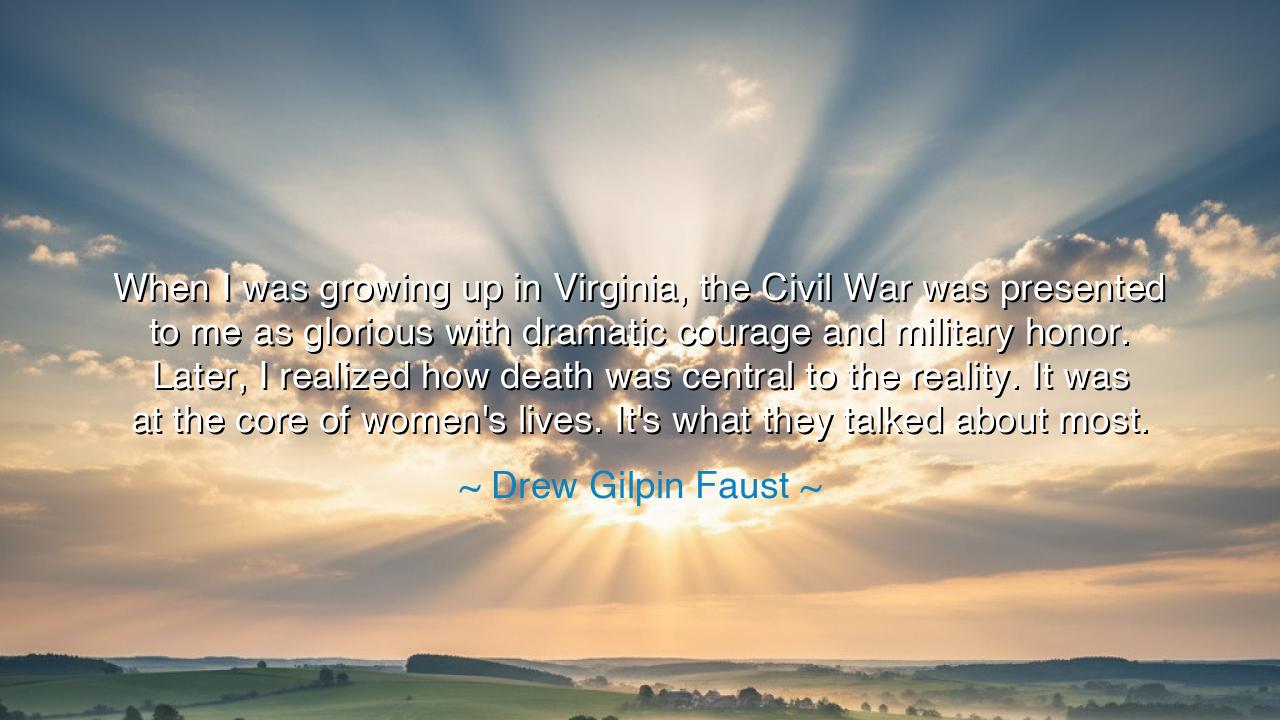
When I was growing up in Virginia, the Civil War was presented to
When I was growing up in Virginia, the Civil War was presented to me as glorious with dramatic courage and military honor. Later, I realized how death was central to the reality. It was at the core of women's lives. It's what they talked about most.






“When I was growing up in Virginia, the Civil War was presented to me as glorious with dramatic courage and military honor. Later, I realized how death was central to the reality. It was at the core of women’s lives. It’s what they talked about most.” — Thus spoke Drew Gilpin Faust, historian and daughter of the American South, whose words pierce the veil of myth that too often shrouds the tragedies of the past. In this reflection, she exposes the divide between legend and truth, between the shining armor of memory and the blood-soaked soil of history. What was once taught as glory she came to see as grief, and what was celebrated as honor she understood as heartbreak. Through her eyes, we are reminded that every tale of war, however noble its telling, is written in the language of loss.
In her youth, Faust grew up surrounded by the echoes of the Confederate legacy, in a Virginia still steeped in the romanticism of the “Lost Cause.” The Civil War, as told in those days, was not the brutal reckoning it truly was, but a grand saga — men in gray and blue, dueling with valor beneath banners of destiny. The dead were not mourned but immortalized; the suffering of civilians, especially women, was hushed beneath the drumbeats of pride. Yet, as Faust matured and became a scholar of history, she uncovered the darker music beneath the tune — the cries of mothers, widows, and sisters whose days were measured by funerals, whose nights were haunted by the silence of those who never returned.
In her acclaimed work This Republic of Suffering, Faust revealed that the true legacy of the Civil War was death itself — death not only of soldiers on the field, but of the very innocence with which Americans once regarded war. Over six hundred thousand lives were lost, a toll so vast that it changed the very relationship between the nation and mortality. Women, left to bury their loved ones, to tend to the dying, and to endure the absence of entire generations of men, became the keepers of this sorrow. They spoke of death, not because they glorified it, but because it surrounded them like the air they breathed. Thus, while men fought for ideals and causes, women bore the burden of consequence.
The ancients, too, understood this truth — that war, though waged in the name of honor, always leaves its deepest scars on the innocent. Consider Hecuba of Troy, the queen who watched her sons slain, her city burned, and her daughters taken as slaves. For her, glory meant nothing; victory and defeat alike were drowned in tears. Homer sang of Achilles and Hector, of courage and wrath, but behind his verses stood the silent grief of women like Hecuba and Andromache — the true witnesses of war’s cost. So too in America’s Civil War, the songs of valor could not drown out the sobs of widows in Virginia, Georgia, and Pennsylvania. Faust’s realization is but a modern echo of this timeless lament.
In awakening to this truth, Faust reminds us of the moral responsibility of remembrance. To remember war honestly is not to deny its bravery, but to refuse its false beauty. The problem, she teaches, is not that courage exists, but that courage is often used to disguise horror. The myth of glory blinds us to the truth of suffering, and in doing so, we risk repeating history’s mistakes. For when war is seen as noble, it becomes desirable; when it is seen as tragic, it becomes a warning. The women who filled their parlors with mourning cloths, who stitched names onto shrouds, who buried sons and husbands by hand — they understood this wisdom in their bones.
Even now, her words reach beyond the fields of Gettysburg and Antietam. They speak to every generation that glorifies conflict, to every nation that forgets that war’s first casualty is innocence. It is easy, in times of peace, to speak of honor and sacrifice, but harder to face the emptiness left behind. Faust’s transformation — from child of myth to historian of truth — is the journey every society must take: from pride to humility, from blindness to vision. The lesson is not to scorn courage, but to honor it honestly — by recognizing its cost.
So remember this, my child: war is not a tale of heroes, but of humanity, fragile and wounded. When others speak to you of glory, listen also for the silence that follows the drums — the silence of those who will never speak again. When you honor the brave, honor also the broken. When you tell of victory, tell too of sorrow. For the truth of history, as Faust discovered, is not found in the banners that wave, but in the whispers of those left behind. Let your remembrance be whole — both the courage and the grief — and in doing so, you will honor not only the past, but the eternal dignity of life itself.






AAdministratorAdministrator
Welcome, honored guests. Please leave a comment, we will respond soon